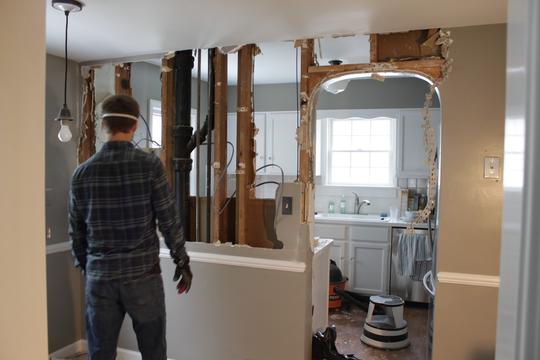
 How to protect your bottom line.
How to protect your bottom line.
You’ve asked friends to recommend great contractors, picked your favorite, checked references — and maybe even conducted an online background check on his business. So you know you’ve found a top-notch guy for your home improvement project.
But remember that his bottom line is getting you to sign a contract, and he’s not going to mention anything that might get in the way. Before you make a commitment, here’s what you need to know in order to protect your own bottom line.
1. He’s Not the Only Game in Town
Even if you believe you found the best contractor in the area, don’t hire him unless you’re sure he’s right for your project.
You should solicit at least three bids from three different contractors before awarding a home improvement project. This way you can make an educated hiring decision by comparing costs, methods, and materials.
What you should do: Make sure you have a basis for comparison when asking for bids. Provide each contractor with the same project details. This may include materials you wish to use and floor plans. Although cost should be one of your deciding factors, other points to consider include scheduling and communication style.
TIP: Once you picked the best contractor for the job, keep your project on track with an ironclad contract.
2. He's Going to Farm Out the Work
General contractors often don’t do the physical work themselves. They might have been carpenters or plumbers, but now that they run their own businesses, they’ve retired their tool belts.
Instead, their role is to sign clients, manage budgets, and schedule a cast of subcontractors. When he’s trying to win your business, a contractor can be pretty vague about how involved he’s going to be — and who will be running the job day-to-day.
What you should do: Inquire who will be in charge of the job site. Ask to meet the job foreman, preferably while he’s at work on a current job site, says Stockbridge, Mass., contractor Jay Rhind. “You want to make sure you feel comfortable with him.”
TIP: Don’t underestimate the power of being nice. It can help keep your contractor and crew on track while improving the quality of their work.
3. A Big Deposit is Unnecessary — and Possibly Illegal
When you sign a contract, you’re usually expected to pay a deposit. But that’s not for covering the contractor’s initial materials or set-up costs.
If his business is financially sound and he’s in good standing with his suppliers, he shouldn’t need to pay for anything up front. In fact, many states limit a contractor’s advance. California maxes out deposits at 10% of the job cost, or $1,000 — whichever is smaller. To find out what the law is in your area, check with your local or state consumer agency.
What you should do: A small deposit is reasonable to kick off a project. But your payment plan should be based on a defined amount of work being completed. This way, if the work isn’t proceeding according to schedule, the payments will be delayed.
TIP: When possible, charge it. The Federal Trade Commission suggests when paying for home improvement work, use a credit card. Doing so may protect homeowners if a project goes south. After making a good faith effort to workout any problems with your contractor, consumers have the right to withhold payment up to the amount of credit outstanding for the purchase. This includes any finance or related charges.
4. He's Not Only Marking Up Labor, But Materials, Too
No contractor wants to talk about it, but he’s going to mark up everything he pays out to make your job happen. That’s fair; it’s how he pays his own overhead and salary. Keep it in mind that the 50% or more markup may apply not just to materials but labor costs, too.
What you should do: If you can handle buying items such as plumbing fixtures, cabinets, countertops, and flooring, ask your contractor to take them out of his bid price. Be sure to agree on specific numbers and amounts of what you’ll be buying, and that you’ll have the items to the job site when they’re needed. You could save 10% to 20% or more on the overall cost of the project.
TIP: Salvage materials are one way to save on building costs. Just make sure you use upcycled stuff wisely so you don’t harm your home’s value.
5. He’s Not the Design Whiz He Claims to Be
Sure, there are contractors who have strong design abilities. Chances are, however, they’re spending a lot more time running their businesses than honing their design chops.
What you should do: Depending upon the complexity of your project, you may need a number of skilled pros to get the job done. So don’t count on a contractor to design your space and add clever details, unless he clearly demonstrates his abilities and has a portfolio of his own work.
Ask his references specifically about his design skills. Keep in mind, in some instances you might be better off hiring an architect for overall planning, and a kitchen and bath designer for the details.
Original Article Link